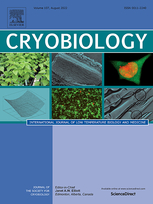
La teneur en glutathion réduit dans du sperme humain diminue suite à la cryoconservation : effet de l'ajout de glutathion réduit aux agents d'extension de la congélation et la décongélation.
Reduced glutathione content in human sperm is decreased after cryopreservation: effect of the addition of reduced glutathione to the freezing and thawing extenders.
Résumé
In this study, total glutathione content was determined in human spermatozoa before and after cryopreservation. Total GSH in fresh semen was 4.47 ± 0.46 nmol/10^8 cells. Following semen cryopreservation, GSH decreased to 1.62 ± 0.13 nmol/10^8 cells, a 64% reduction (p < 0.01). This decrease in GSH content was associated with a decrease in sperm progressive motility (68% of reduction, p < 0.01). Addition of 1 mM GSH to the freezing extender increased the percentage of total motility and sperm viability. It also modified the motility pattern measured by CASA with changes in the straight-line and average path velocities and wobble of the curvilinear trajectory. Addition of GSH to the freezing media reduced spermatozoa ROS levels and increased the level of sulfhydryl groups on membrane proteins. Nevertheless, no effect of GSH addition on lipid membrane disorder or chromatin condensation was detected. Addition of 1 or 5 mM GSH to the thawing media increased the percentage of motile and progressively motile spermatozoa, but no effect on viability was detected. In conclusion, the antioxidant defensive capacity of the GSH is severely altered by the freeze–thawing process. The addition of GSH to the freezing and thawing extender could be of partial and limited benefit in improving the function of frozen human spermatozoa. [Reprinted with permission from Elsevier. Copyright, 2010].
Détails
- Titre original : Reduced glutathione content in human sperm is decreased after cryopreservation: effect of the addition of reduced glutathione to the freezing and thawing extenders.
- Identifiant de la fiche : 30003667
- Langues : Anglais
- Source : Cryobiology - vol. 62 - n. 1
- Date d'édition : 02/2011
- DOI : http://dx.doi.org/10.1016/j.cryobiol.2010.12.001
Liens
Voir d'autres articles du même numéro (1)
Voir la source
Indexation
- Thèmes : Influence du froid sur les cellules, tissus et organes
- Mots-clés : Sperme; Cryoprotecteur; Poisson; Experimentation; Cryoconservation
-
Cryopreservation of tambaqui (Colossoma macropo...
- Auteurs : CARNEIRO P. C. F., AZEVEDO H. C., SANTOS J. P., et al.
- Date : 09/2012
- Langues : Anglais
- Source : CryoLetters - vol. 33 - n. 5
Voir la fiche
-
Effect of cryopreservation on fish sperm subpop...
- Auteurs : BEIRÄO J., CABRITA E., PÉREZ-CEREZALES S., et al.
- Date : 02/2011
- Langues : Anglais
- Source : Cryobiology - vol. 62 - n. 1
Voir la fiche
-
Effects of dimethyl sulfoxide and glycine on cr...
- Auteurs : HE S., WOODS L. C. III
- Date : 06/2004
- Langues : Anglais
- Source : Cryobiology - vol. 48 - n. 3
Voir la fiche
-
Cryopreservation of seabream (Sparus aurata) sp...
- Auteurs : FABBROCINI S., LAVADERA S. L., RISPOLI S., et al.
- Date : 02/2000
- Langues : Anglais
- Source : Cryobiology - vol. 40 - n. 1
Voir la fiche
-
Cryopreservation of European catfish (Silurus g...
- Auteurs : LINHART O., RODINA M., FLAJSHANS M., et al.
- Date : 12/2005
- Langues : Anglais
- Source : Cryobiology - vol. 51 - n. 3
Voir la fiche
